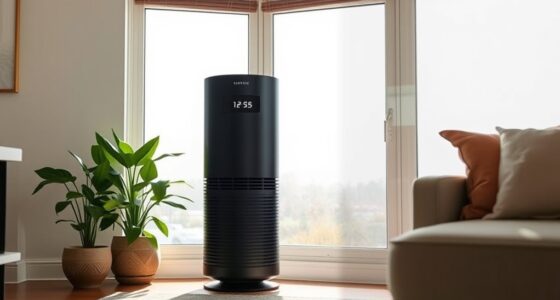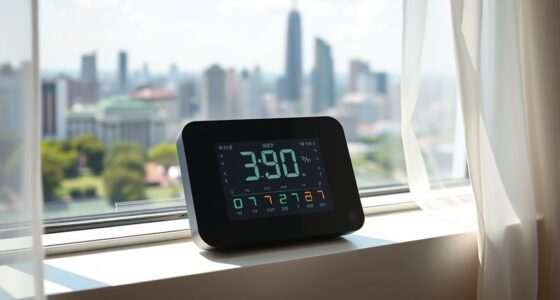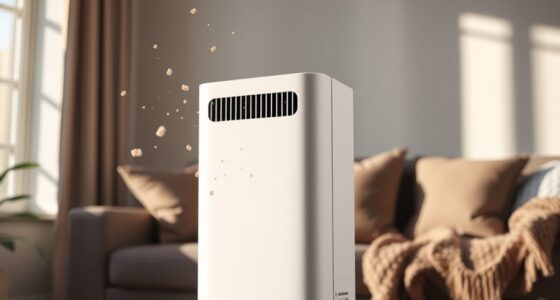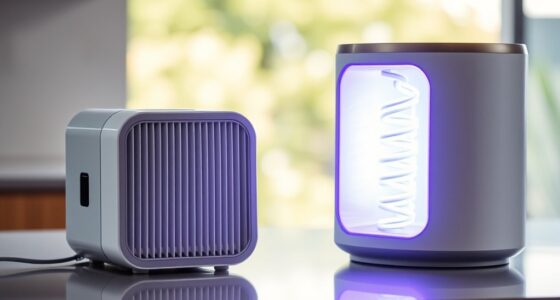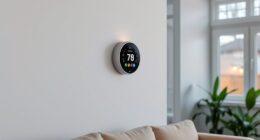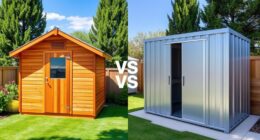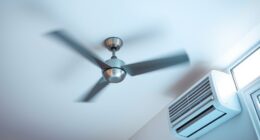Air purifiers can help improve your sleep by reducing airborne pollutants, allergens, and irritants that cause disruptions. They may increase deep sleep duration slightly and improve your overall sleep quality, especially if you suffer from allergies or respiratory issues. Proper placement and regular maintenance are key to maximizing benefits. Keep in mind that some improvements are perceptual and may vary. If you’re curious about how to get the best results, there’s more to discover below.
Key Takeaways
- Air purifiers with HEPA filters can increase deep sleep duration by reducing airborne pollutants and improving sleep environment quality.
- They often decrease allergy and respiratory symptoms, leading to fewer awakenings and better sleep comfort.
- Proper placement and regular filter maintenance maximize air purifier efficiency and sleep benefits.
- Subjective sleep improvements are common, even if objective data shows limited changes.
- Long-term use can support healthier sleep, especially for allergy sufferers and individuals in polluted indoor environments.
How Air Purifiers Affect Deep Sleep Duration

Air purifiers can substantially enhance your deep sleep duration by creating a cleaner and more comfortable sleeping environment. A PuroAir 240 study shows a 6% increase in deep sleep, roughly four extra minutes each night. Using a HEPA air purifier can boost total sleep time by about 12 minutes, with improved sleep efficiency indicating more consolidated deep sleep phases. If you suffer from allergies, reducing airborne allergens lessens nasal congestion and sneezing, leading to fewer micro-awakenings and longer deep sleep cycles. Objective measurements confirm that air purifiers promote continuous sleep bouts, supporting restorative sleep. Quiet purifiers with low noise levels help maintain sleep continuity by minimizing environmental disruptions. Overall, cleaner air fosters longer, more restorative deep sleep, improving your sleep quality and overall well-being.
The Impact of Air Quality on Sleep Continuity
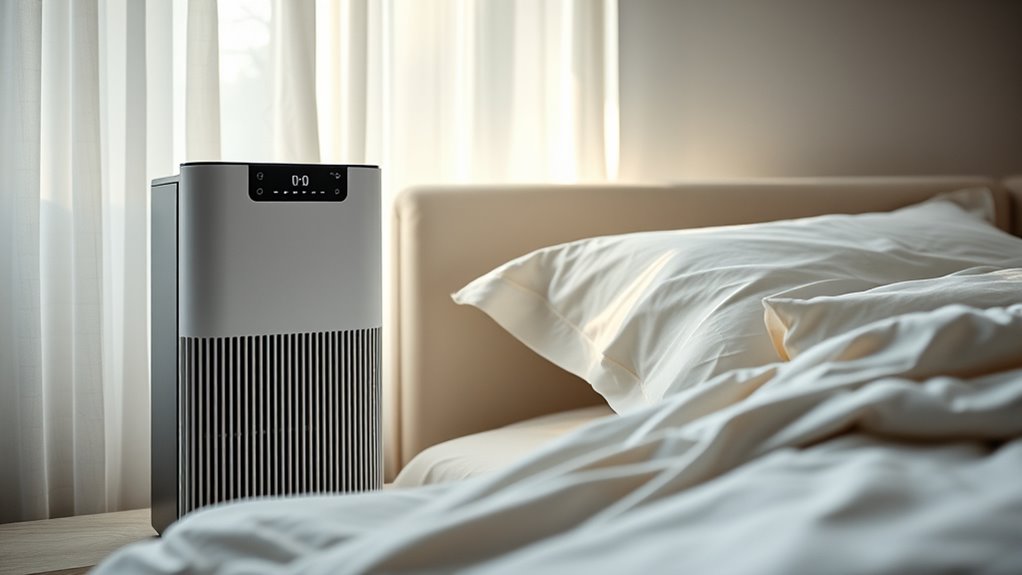
Have you ever wondered how your bedroom environment affects your ability to stay asleep? Poor air quality can considerably disrupt sleep continuity by causing frequent awakenings and reducing uninterrupted sleep periods. Elevated indoor pollutants like PM2.5 and CO2 can lead to micro-arousals, making it harder to stay in deep, restorative sleep. Higher levels of nitrogen dioxide and carbon monoxide, even over short periods, are linked to more fragmented sleep and increased wakefulness after sleep onset. Noise pollution combined with poor air quality further worsens sleep fragmentation. Long-term exposure to indoor pollutants not only reduces sleep quality but also diminishes the amount of slow-wave sleep, impairing restorative functions. Effective air filtration can significantly reduce indoor pollutants, supporting healthier sleep patterns. Living in areas with high air pollution increases sleep disturbances by 60%, improving indoor air quality can help maintain consistent, uninterrupted sleep cycles, promoting better overall sleep health.
Reducing Allergy and Respiratory Symptoms for Better Rest

Reducing allergy and respiratory symptoms can considerably improve your quality of sleep. Air purifiers with HEPA filters capture tiny airborne allergens like dust mites, pet dander, mold spores, and pollen, decreasing your exposure. Studies show that using air purifiers leads to a 27% reduction in allergy symptom severity, including sneezing, congestion, and itchy eyes, while over 80% of users report better sleep and allergy relief. For allergy sufferers, consistent use of HEPA purifiers lowers the need for medication and minimizes nighttime symptoms. Additionally, these devices improve respiratory health by reducing triggers that cause asthma attacks and airway irritation. HEPA filters capture 99.9% of airborne contaminants, ensuring cleaner air and further supporting healthier breathing during sleep. Incorporating air quality improvements in your environment can further enhance overall well-being and sleep quality.
Perceived Versus Measured Improvements in Sleep Quality
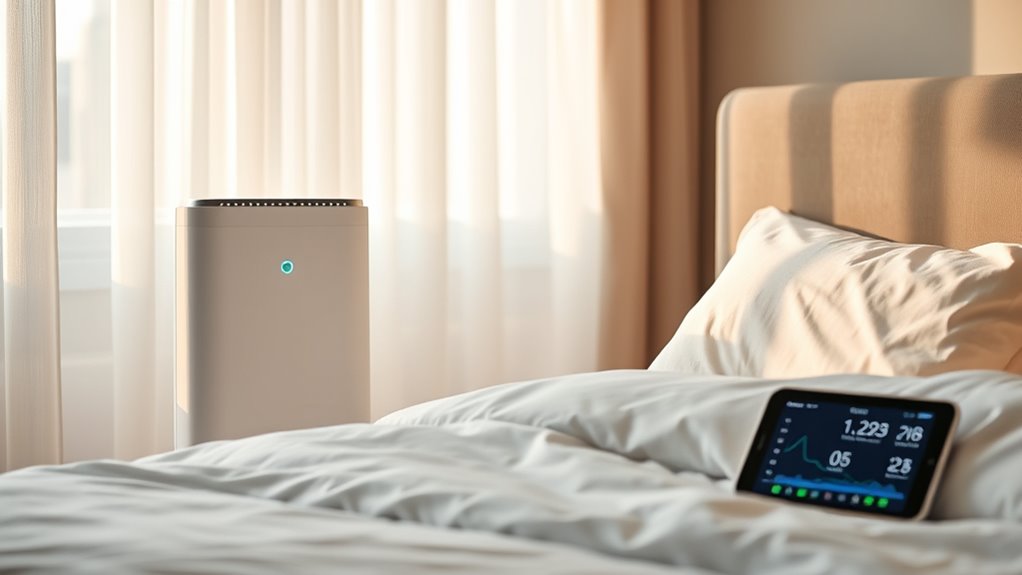
You might notice feeling more rested after using an air purifier, but the data doesn’t always back up that perception. Placebo effects and personal expectations can influence how you perceive your sleep, even if objective measurements show little change. Individual responses vary widely, making it important to contemplate both subjective reports and scientific data when evaluating sleep improvements. Research indicates that the perceived benefits may sometimes stem from psychological factors rather than measurable changes in sleep quality. Additionally, understanding the role of emotional triggers can help explain why some users believe air purifiers enhance their sleep experience, regardless of measurable outcomes.
Subjective Perception Vs Data
While air purifiers with HEPA filters can produce measurable improvements in sleep duration and reduce allergy symptoms, the connection between perceived and actual sleep quality isn’t always straightforward. You might feel like you’re sleeping better, yet data shows mixed results. For example, studies report about 12 more minutes of sleep per night, but wake times after sleep onset may increase. Participants often perceive easier sleep onset and fewer awakenings, especially if allergy symptoms improve. However, some objective metrics, like sleep efficiency, don’t always match these perceptions. Here’s a quick look:
| Perceived Improvement | Objective Data | Discrepancies |
|---|---|---|
| Feeling refreshed | Sleep duration | Wake after sleep onset may increase |
| Fewer nighttime awakenings | Symptom relief | Some measures show modest changes |
| Better sleep onset | Sleep scores | Perception can overstate actual gains |
| Reduced allergy symptoms | Deep sleep increase | Subjective and objective align partly |
| Long-term satisfaction | Sleep quality indices | Not always directly correlated |
Additionally, air quality improvements can influence how people perceive their sleep, sometimes leading to a more positive outlook regardless of measurable changes. Understanding the technological advances in air purifiers can help consumers make more informed decisions about their potential benefits.
Placebo and Expectation Effects
Research shows that expectation effects and placebo responses play significant roles in perceived sleep improvements when using air purifiers. Your beliefs about the device can influence what you feel and report, even if actual sleep doesn’t change much. Studies using placebo filters reveal that many people report better sleep simply because they think the purifier is active. Sometimes, both real and placebo conditions show similar sleep improvements, highlighting expectation’s power. Dyson’s research into air quality and sleep indicates that psychological factors can significantly impact perceived wellbeing. Additionally, the power of suggestion can lead individuals to believe they are experiencing better sleep, regardless of measurable changes. Key points include: 1. Double-blind studies help differentiate real benefits from placebo effects. 2. Subjective reports often outpace objective sleep data. 3. Feelings of reassurance and control boost perceived sleep quality. 4. Limited sample sizes and short studies can exaggerate placebo influences.
Variability Among Individuals
Individual responses to air purifiers vary widely, especially when comparing perceived sleep improvements to objective measurements. You might feel like your sleep has improved, with easier sleep onset and fewer nighttime awakenings, even if sleep trackers show minimal change. For allergy sufferers, symptom relief often translates to better sleep and higher satisfaction, but those without allergies may see less benefit. Objective data, like actigraphy, typically shows small increases in total sleep time—around 12 minutes—yet perceptions can be more positive. Factors like baseline health, environmental air quality, and individual sensitivity influence these differences. Some people notice significant benefits, especially when allergies or respiratory issues are involved, while others see little to no measurable change, highlighting the variability in individual experiences. Additionally, the Molekule Air Mini+ features such as auto-adjusting fan speeds and smart controls contribute to an improved sleep environment, which may enhance perceived sleep quality even if measurable changes are subtle. Moreover, air purifier technology continues to evolve, offering features that can further influence sleep quality perceptions.
Scientific Insights Into Pollution and Sleep Disruption
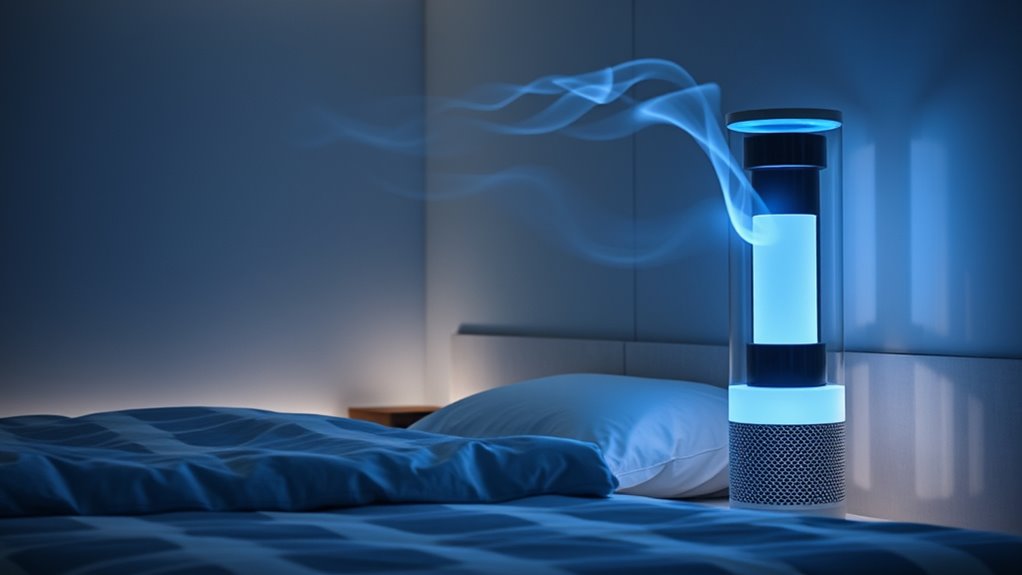
Scientific studies have uncovered clear links between air pollution and sleep disruption, revealing how pollutants like PM2.5 and NO2 impair sleep quality and increase sleep-related breathing disorders. These pollutants raise the risk of sleep apnea, worsen oxygen desaturation, and lower sleep efficiency, especially during spring and winter. Higher exposure levels, particularly from traffic-related pollution, strongly correlate with airway inflammation, swelling, and obstruction, all contributing to conditions like sleep apnea. Additionally, young children exposed prenatally or early in life experience lasting sleep disturbances. To deepen your understanding:
- PM2.5 and NO2 increase sleep apnea risk, especially in older adults.
- Traffic pollution reduces sleep efficiency independently of other factors.
- Air pollution triggers airway inflammation, leading to obstructions.
- Early exposure affects neurodevelopment and long-term sleep health.
- The integration of air purifiers with HEPA filters can significantly reduce airborne pollutants, potentially improving sleep quality.
These insights highlight how pollution directly impacts sleep, underscoring the potential benefits of air purification.
Variability in Sleep Outcomes With Air Purifier Use
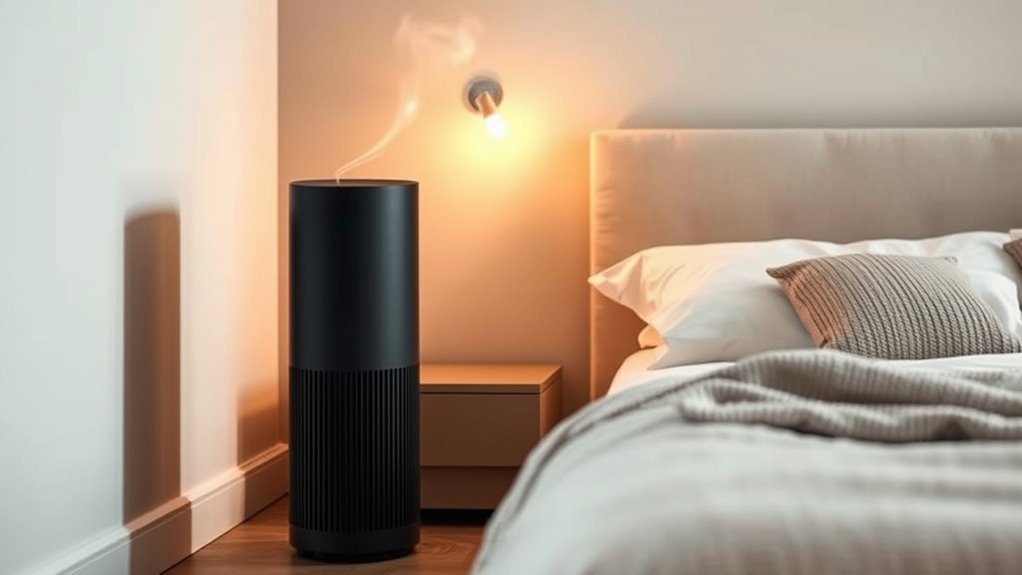
Although many people turn to air purifiers expecting consistent improvements in sleep, outcomes often vary widely. On average, you might gain about 12 extra minutes of sleep per night, but this isn’t guaranteed. Some see increased time in bed—around 19 minutes—but that doesn’t always mean better sleep efficiency. Results depend heavily on your baseline health; those with respiratory issues may experience more noticeable benefits than healthy individuals. Longer or consistent use can enhance sleep duration over time. Sleep architecture effects are also inconsistent—some report more deep sleep, while others experience more awakenings. Subjective perceptions tend to improve, especially if you have allergies, but these feelings don’t always match objective measures. Overall, your results will depend on personal health, expectations, and how long you use the purifier.
Benefits for Allergy Sufferers and Respiratory Health
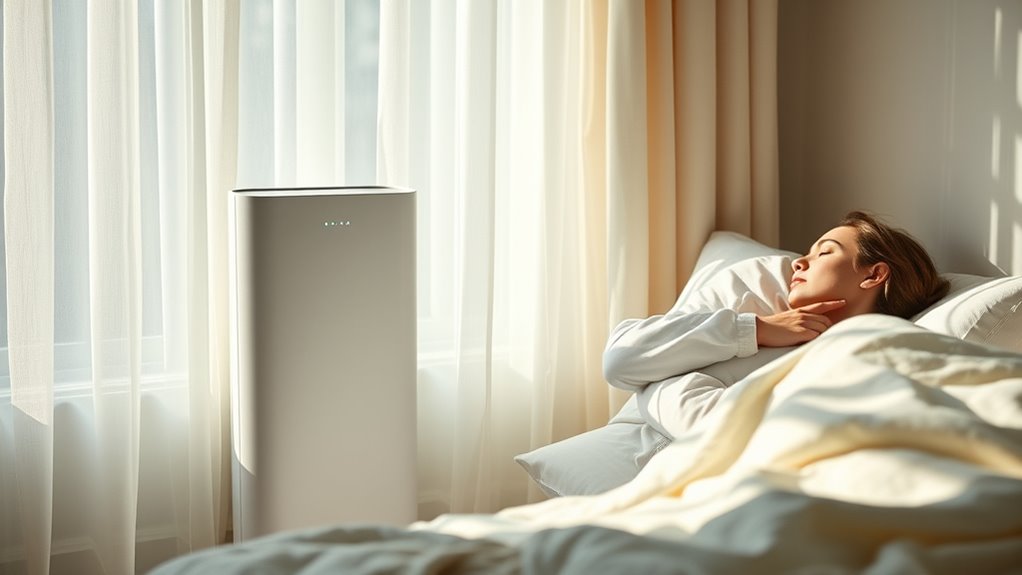
Air purifiers offer significant benefits for allergy sufferers and those with respiratory issues by actively reducing airborne allergens such as pollen, dust mites, and pet dander. This reduction eases allergy symptoms and helps you breathe more comfortably during sleep. Here are four key benefits:
- Symptom Relief: Decreases sneezing, runny noses, itchy eyes, and redness by up to 63%, improving sleep quality.
- Better Breathing: Reduces nasal congestion and airway inflammation, making it easier to breathe at night.
- Respiratory Health: Lowers airborne irritants, which decreases coughing, wheezing, and the risk of respiratory infections.
- Long-term Impact: Consistent use supports healthier lungs and fewer exacerbations of chronic respiratory conditions.
Using an air purifier can make a noticeable difference in your allergy and respiratory health, especially when combined with other air quality improvements.
Factors Influencing the Effectiveness of Air Purification

The effectiveness of air purification depends heavily on several interconnected factors, including how well the indoor environment minimizes outdoor pollutant entry, the placement and number of purifiers, and the types of filters used. Higher air change rates and outdoor infiltration can reduce purifier efficiency by allowing pollutants to re-enter. Sealing rooms helps maximize particulate removal but may trap gaseous contaminants and lower energy efficiency. Distributing multiple smaller purifiers across rooms improves overall air quality more effectively than a single unit, ensuring uniform coverage. Choosing the right filters is also vital: HEPA filters target particles, while activated carbon handles gases and odors. Regular maintenance and filter replacements keep purifiers operating at peak performance, directly influencing their ability to improve your sleep environment. Sealing indoor spaces can significantly enhance the effectiveness of particulate removal but requires careful management to avoid indoor air quality issues related to gaseous pollutants.
Practical Tips for Maximizing Sleep Benefits With Air Purifiers
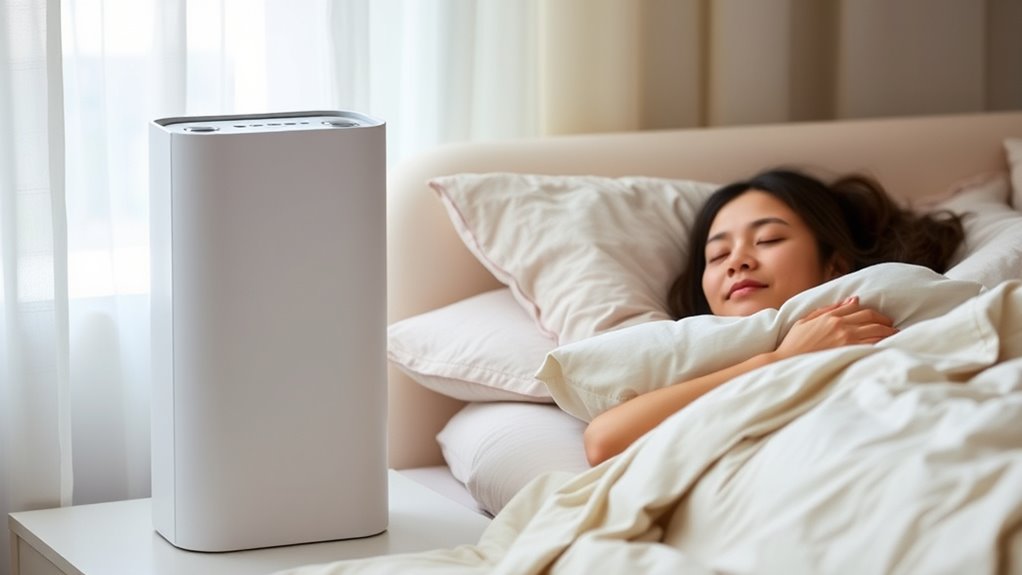
To get the most sleep benefits from your air purifier, place it close to your sleeping area where it can effectively clean the air throughout the night. Make sure to operate it continuously or set a timer so fresh air is maintained during your sleep, and check that filters are replaced regularly for peak performance. Proper placement and upkeep are key to maximizing its impact on your sleep quality. Additionally, selecting a model with HEPA filtration can ensure the removal of small particles like pollen and pet dander, further improving sleep comfort.
Optimal Purifier Placement
Placing your air purifier correctly can substantially enhance your sleep quality by guaranteeing clean air reaches your breathing zone effectively. To maximize placement, keep these tips in mind:
- Position near your bed—place the purifier on a nightstand or small table close to your head to reduce the distance clean air travels before inhalation.
- Elevate to about three feet—set it on a dresser or nightstand to leverage natural airflow patterns for better air circulation.
- Avoid obstructions—keep the purifier away from walls, furniture, or curtains to prevent airflow blockage and promote maximum efficiency.
- Place strategically—position it between pollutant sources and your sleeping area, ensuring airflow directs clean air toward you without being dispersed by strong drafts.
- Ensure proper ventilation—regularly check that the purifier’s intake and outtake vents are unobstructed to maintain optimal airflow and filtration performance which enhances overall air quality.
- Consider the size of the room—select an air purifier rated appropriately for your room size to optimize its effectiveness and energy use which is crucial for efficient operation.
Proper placement ensures maximum filtration, reducing airborne irritants and improving your sleep.
Regular Filter Maintenance
Regular filter maintenance is essential for ensuring your air purifier continues to provide clean, healthy air that supports restful sleep. You should replace HEPA filters every 6 to 12 months, depending on usage and air quality, while carbon filters need changing every 3 to 6 months. Using filters with indicators or apps helps you stay on top of replacements, preventing pollutants from building up and being released back into your environment. Regularly cleaning pre-filters every 2 to 4 weeks removes large particles and extends the life of HEPA filters. Keep an eye on airflow and listen for increased noise, which signals a clogged filter. Proper maintenance guarantees your purifier runs efficiently, removing allergens and irritants that could disrupt your sleep. Additionally, replacement schedules vary based on the purifier’s model and your specific environment, ensuring you adjust maintenance routines accordingly for optimal performance.
Frequently Asked Questions
Can Air Purifiers Help Improve Sleep for Healthy Individuals Without Allergies?
You might wonder if air purifiers can boost sleep quality for healthy people without allergies. The evidence suggests they can offer modest benefits, like about 12 extra minutes of sleep and more time in bed, mainly by improving indoor air quality. While these improvements are small and don’t substantially affect mood or sleep architecture, cleaner air may help you sleep a little better by reducing irritants and airway resistance.
How Long Does It Typically Take to Notice Sleep Improvements After Using an Air Purifier?
You’ll usually notice sleep improvements within two weeks of using an air purifier. Some people experience quick relief from nasal congestion and better breathing in just a few days, especially if they have allergies or asthma. Consistent use, good filter quality, and room size all influence how fast you see benefits. Keep using it regularly, and over time, you may enjoy more restful, uninterrupted sleep as your indoor air quality improves.
Are All Air Purifiers Equally Effective at Enhancing Sleep Quality?
Imagine a knight with a shield—some are stronger than others. Not all air purifiers are equally effective at boosting sleep quality. You’ll find that models with true HEPA filters, like Dyson or Alen, markedly improve sleep by reducing allergens and pollutants. Cheaper or placebo filters don’t deliver the same benefits. So, choose wisely, as a high-quality purifier makes a real difference, especially if allergies or sensitivities are involved.
Do Air Purifiers Reduce Indoor Air Pollutants Besides Allergens, Like VOCS?
You ask if air purifiers reduce indoor pollutants beyond allergens, like VOCs. Many models with activated carbon filters can adsorb VOCs, but effectiveness varies widely. Larger, high-quality filters with supplemental adsorbents work better, especially in smaller, well-ventilated rooms. Keep in mind, not all purifiers are equally effective, and performance depends on filter quality, size, and maintenance. For best results, choose a device specifically rated for VOC removal.
Can Using an Air Purifier Replace Other Sleep Hygiene Practices?
You might wonder if an air purifier can replace other sleep hygiene practices. While it helps reduce allergens and improve breathing, it can’t address habits like maintaining a consistent sleep schedule, limiting screen time, or controlling room temperature. Relying solely on an air purifier isn’t enough. For better sleep, combine it with good sleep habits, especially if you have allergies or respiratory issues, to get the best results.
Conclusion
While air purifiers can help improve your sleep, they’re not magic wands. Think of them as a helpful ally in creating a cleaner, more restful environment—your own personal oasis. To truly harness their benefits, focus on consistent use and good overall sleep habits. Remember, a breath of fresh air isn’t just a metaphor—it’s the key to better nights and brighter mornings. So, breathe deep and let your sleep take flight.


